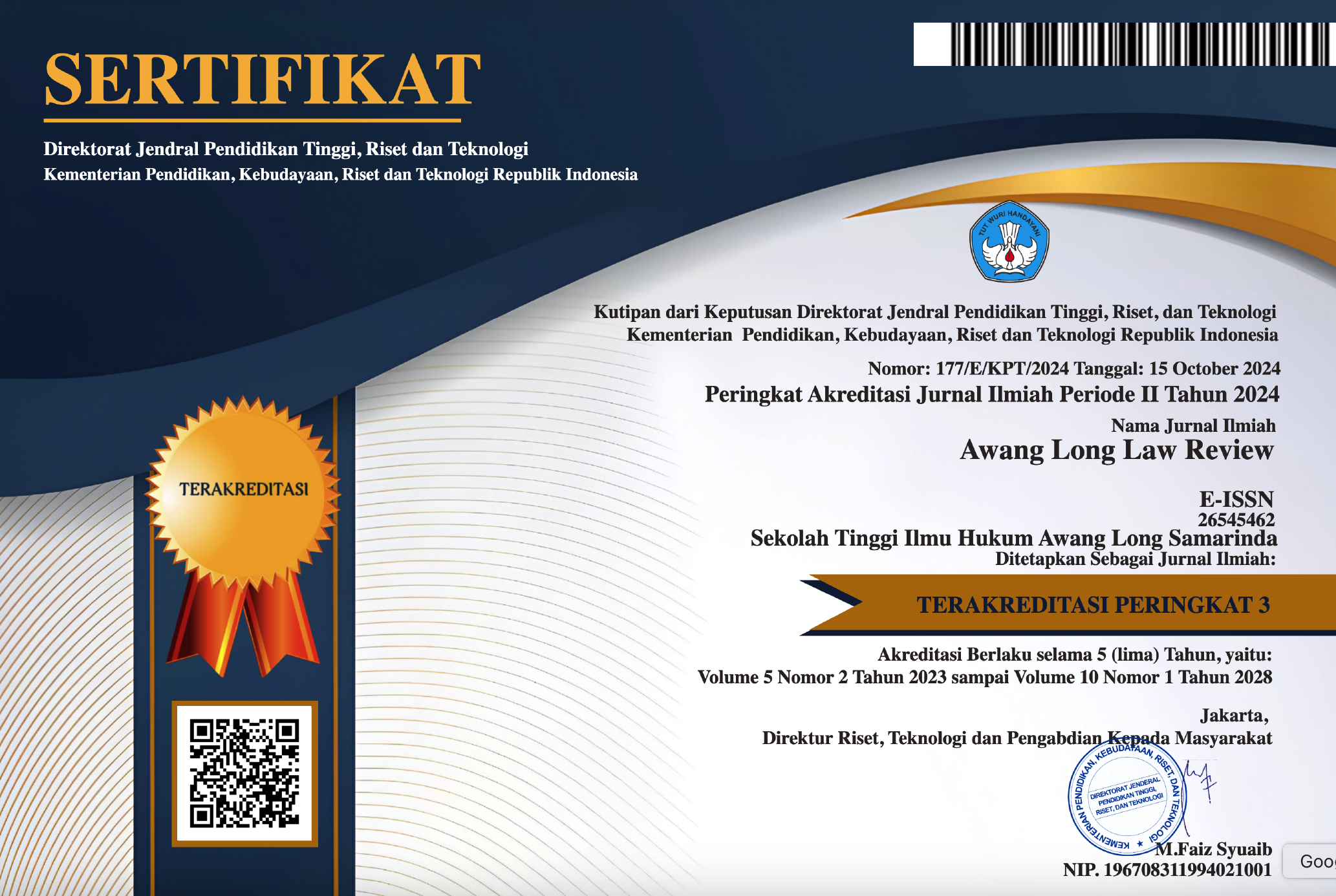THE APPLICATIONS OF DECLARATION DECISIONS ON CIVIL PROCEDURE LAW IN INDONESIA
Abstract
Declaratory judgment is one of the decisions that can be given by the court to confirm a pre-existing legal right or situation, and not to provide new recognition or ratification. Declaratory decisions do not require execution because the decision explains the existing situation or the actual situation. The Civil Procedure Law has not fully addressed the problems related to execution that have become complaints from the public, especially regarding the governance and execution procedures that can produce an effective and efficient process. Some of the problems that will be analyzed are whether a declaration decision can be requested for execution and find out the time limit for requesting execution of the declaration decision. Furthermore, the study will explore the broader implications of these legal gaps, such as how they contribute to delays in the resolution of disputes and the challenges faced by parties seeking justice. This lack of clear regulation significantly hinders the smooth enforcement of the judicial process and contributes to unresolved legal disputes. Juridical-normative research results in finding a legal vacuum in the regulation of execution of civil procedural law in Indonesia. In this case, it’s the declaration decision that does not need to be requested for execution, if you want to execute it, you need to file a new lawsuit. However, it should be noted that there is no provision that regulates the period of time when the decision must be executed by the losing party or the time limit for the execution of the execution decision.
Downloads
References
Ali, Zainudin. (2011). Legal Research Methods. Jakarta: Sinar Grafika.
Bandung High Court, "Execution Procedure", https://pt-bandung.go.id/prosedureksekusi.html#:~:text=Execution%20is%20the%20implementation%20of%20a%20judgment%20that%20has%20permanent%20legal%20force%2C%20including%20a%20decision%20on%20cassation%20and/or%20judicial%20review. Copyright 2017 Designed by the Supreme Court [Accessed on Thursday, August 10, 2023, at 07:19 WIB].
Harahap, Yahya. (2010). Scope of Issues in Civil Execution, Second Edition. Jakarta: Sinar Grafika.
Harahap, Yahya. (2021). Civil Procedure Law, Second Edition. Jakarta: Sinar Grafika.
Hidayat, Rofiq, "Here Are PERADI's Inputs to Luhut's Leadership Regarding the Implementation of Court Decision Execution". https://www.hukumonline.com/berita/a/begini-masukan-peradi-pimpinan-luhut-terkait-pelaksanaan-eksekusi-putusan-lt629f0f25c2802/?page=all. June 7, 2022 [Accessed on July 2, 2024].
HIR (Herziene Indlandsche Reglement, Staatsblad 1848 No. 16, Staatsblad 1941 No. 44)
Khoidin, M. (2020). Civil Execution Law. Yogyakarta: LaksBang Justitia.
Law No. 20 of 1974 on the Court of Appeal for Java and Madura
Law No. 4 of 2004 on Judicial Power, amended by Law No. 48 of 2009
Law No. 14 of 1985 on the Supreme Court, amended by Law No. 5 of 2004 and Law No. 3 of 2009
Law No. 2 of 1986 on General Courts, amended by Law No. 8 of 2004 and Law No. 49 of 2009
Lie, Erick Sambuari, Muhamad H. Soepeno, and Adi T. Koesumo. (2023). Legal Implications of Parties Failing to Implement Court Decisions in Civil Cases, Lex Privatum Vol. XI/No. 3/Mar/2023. Manado: Universitas Sam Ratulangi.
Makarao, Moh. Taufik. (2004). Essentials of Civil Procedure Law, First Edition. Jakarta: Rineka Cipta.
Manan, Abdul. (2000). Application of Civil Procedure Law in Religious Courts. Jakarta: Yayasan Al-Hikmah.
Marzuki, Peter Mahmud. (2019). Legal Research, 14th Edition. Jakarta: Kencana.
Mertokusumo, Sudikno. (2009). Indonesian Civil Procedure Law: Eighth Edition. Yogyakarta: LIBERTY.
The Constitution of the Republic of Indonesia 1945
The Civil Code (Burgerlijk Wetboek, Staatsblad 1847 No. 23)
Tresna, Mr. R. (2005). Commentary on HIR, 18th Edition. Jakarta: Pradnya Paramita.
Rasaid, M. Nur. (2003). Civil Procedure Law, Third Edition. Jakarta: Sinar Grafika Offset.
RBg (Reglement voor de Buitengewesten, Staatsblad 1927 No. 227)
RV (Reglement op de Burgerlijke Rechtsvordering, Staatsblad 1847 No. 52, Staatsblad 1849 No. 63)
Copyright (c) 2024 Emi Zulaika, Noviandy Nur Fadillah Putranti Erfandy, Iswi Hariyani

This work is licensed under a Creative Commons Attribution-ShareAlike 4.0 International License.







